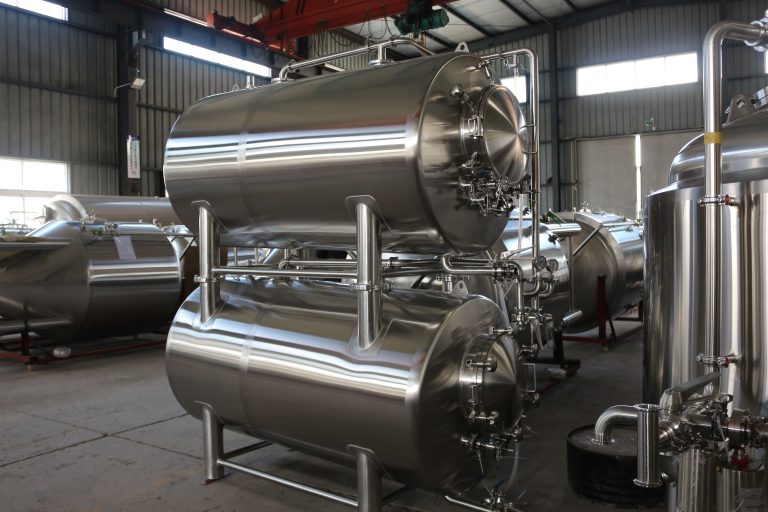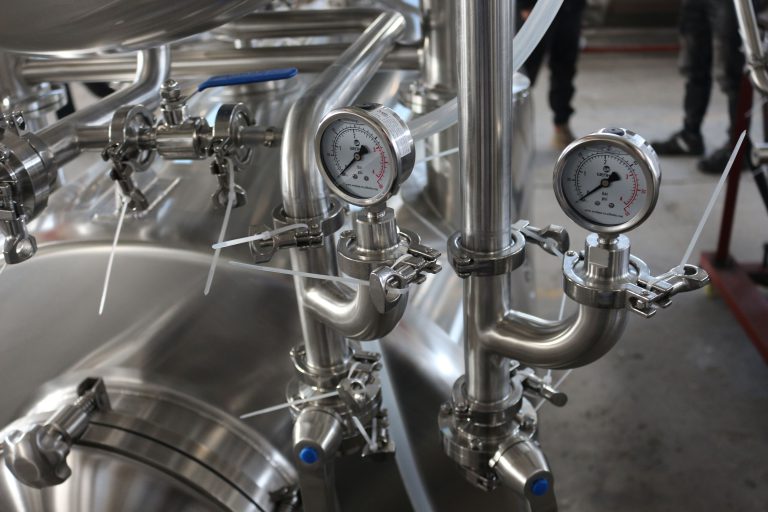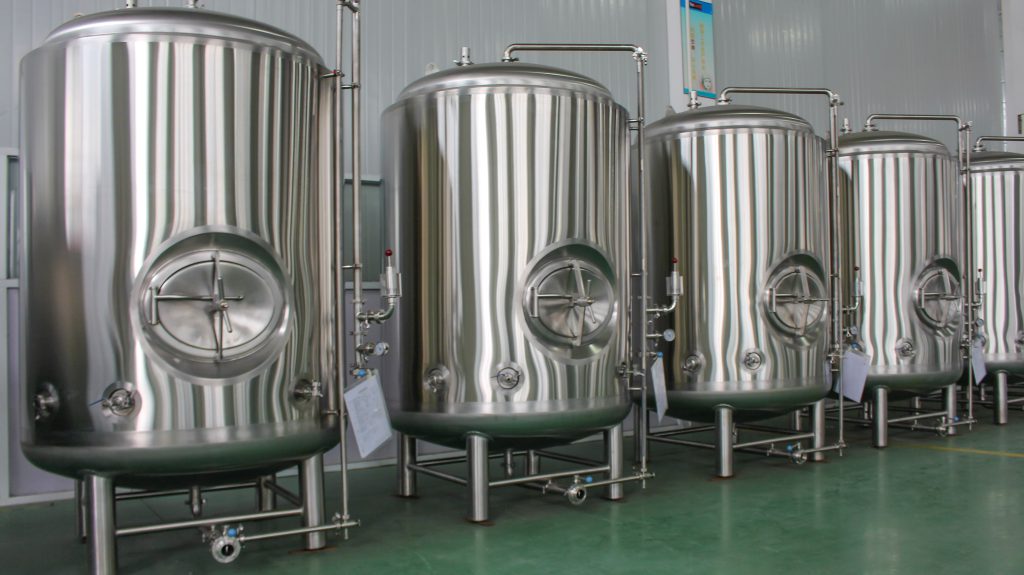Introduction

The art of brewing beer, a craft honed over millennia, has witnessed a remarkable evolution. From rudimentary beginnings to the sophisticated technologies of today, the brewing process has undergone a transformative journey. At the heart of this evolution lie commercial beer brewing machines, intricate systems that orchestrate the complex dance of ingredients to produce the beloved beverages we savor. These machines, marvels of engineering, have revolutionized the brewing landscape, enabling brewers to achieve unparalleled levels of consistency, efficiency, and precision.
This comprehensive guide aims to provide a deep dive into the world of commercial beer brewing machines. We will explore their intricate components, unravel the intricacies of their functions, and guide you through the critical factors to consider when making a purchase decision. Whether you are a seasoned brewer looking to upgrade your equipment or a budding entrepreneur embarking on your brewing journey, this guide will serve as a valuable resource in understanding the nuances of these sophisticated machines and their pivotal role in the modern brewing industry.
Understanding the Basics of Commercial Beer Brewing Machines
Commercial beer brewing machines are sophisticated systems designed to automate and streamline the intricate process of beer production. These machines typically encompass a series of interconnected vessels, each performing a specific function in the transformation of raw ingredients into the final, effervescent beverage.
The mash tun, a cornerstone of the brewing process, is where the magic begins. Here, milled grains are meticulously mixed with hot water in a controlled environment. This process, known as mashing, extracts the sugars from the grains, forming a sweet liquid known as wort.
Following mashing, the lauter tun comes into play. This vessel acts as a separator, efficiently filtering the wort from the spent grain. The spent grain, a byproduct of the mashing process, is then removed, leaving behind a clear, sugary liquid ready for the next stage.
The boil kettle, a robust vessel, is where the wort undergoes a vigorous boiling process. This crucial step serves multiple purposes. Firstly, it sterilizes the wort, eliminating any unwanted microorganisms that could compromise the beer’s quality. Secondly, it concentrates the flavors of the wort by evaporating excess water.
The whirlpool, another vital component, is designed to separate hop particles and other solids from the now-concentrated wort. This process ensures a cleaner, more visually appealing final product.
The fermenter, a temperature-controlled vessel, is where the true magic of transformation occurs. Here, yeast is introduced to the wort, initiating the fermentation process. During fermentation, yeast consumes the sugars in the wort, converting them into alcohol and carbon dioxide.
Finally, the bright beer tank serves as the finishing stage. The beer is transferred to this tank for conditioning and carbonation. Here, any remaining yeast or other particles settle out, resulting in a brilliantly clear and sparkling beer, ready for packaging and distribution.
The Benefits of Using Commercial Beer Brewing Machines
The adoption of commercial beer brewing machines offers a multitude of advantages for modern breweries.
- Cohérence: Perhaps the most significant benefit is the remarkable consistency these machines deliver. By precisely controlling key parameters such as temperature, time, and ingredient ratios, brewers can ensure that each batch of beer exhibits consistent flavor profiles, color, and aroma. This consistency is crucial for building a loyal customer base and maintaining brand reputation.
- Efficacité: Automation is a hallmark of commercial brewing machines. By automating many of the labor-intensive tasks involved in brewing, such as mashing, lautering, and cleaning, these machines significantly enhance efficiency. This translates to reduced labor costs, increased production output, and ultimately, improved profitability for the brewery.
- Évolutivité : Commercial brewing machines are highly scalable, catering to the diverse needs of breweries of all sizes. Whether you are a small-scale microbrewery or a large-scale production facility, you can find a machine that aligns with your production capacity and growth aspirations.
- Precision: The precise control offered by these machines is unparalleled. From maintaining precise temperature control during fermentation to accurately measuring ingredient quantities, these machines minimize human error and ensure that every stage of the brewing process is executed with meticulous accuracy. This level of precision is crucial for producing high-quality beer that consistently meets the highest standards.
Factors to Consider When Purchasing a Commercial Beer Brewing Machine
Investing in a commercial beer brewing machine is a significant decision with long-term implications for your brewery. Careful consideration of several key factors is essential to ensure you select the optimal machine for your specific needs and budget.
- Capacité: Determining the desired production volume is paramount. Consider your current and projected production goals, as well as your long-term growth aspirations. Selecting a machine that can comfortably accommodate your current needs while providing ample headroom for future expansion is crucial.
- Caractéristiques: The array of features available in commercial brewing machines can be quite extensive. Consider features such as automation levels, customization options, energy efficiency, and data logging capabilities. Automation can significantly enhance efficiency and reduce labor costs, while customization options allow you to tailor the machine to your specific brewing styles and preferences. Energy efficiency is crucial for minimizing operating costs and reducing your environmental impact, while data logging capabilities provide valuable insights into the brewing process, enabling you to fine-tune your methods and improve quality.
- Budget: Setting a realistic budget is essential. Consider the upfront costs of the machine, as well as ongoing maintenance costs, spare parts, and potential upgrades.
- Espace: Carefully assess the available space in your brewery. Ensure that the chosen machine fits comfortably within your layout without compromising workflow or safety.
- Entretien: Factor in the long-term maintenance requirements. Consider the availability of spare parts, the ease of maintenance, and the availability of qualified technicians for service and repairs.
Types of Commercial Beer Brewing Machines
Commercial beer brewing machines come in a variety of configurations and sizes, catering to the diverse needs of breweries across the spectrum.
- Modular Brewing Systems: These systems offer a high degree of flexibility and customization. They typically consist of individual components, such as the mash tun, lauter tun, boil kettle, and fermenters, that can be combined and configured to suit specific brewing requirements. This modularity allows brewers to start with a basic system and gradually expand it as their production needs evolve.
- Turnkey Breweries: Turnkey breweries provide a complete, integrated brewing system, including all the necessary equipment, tanks, controls, and utilities. These systems are designed to be easily installed and commissioned, making them a convenient option for new breweries or those looking for a streamlined setup. However, they often offer less flexibility in terms of customization compared to modular systems.
- Pilot Systems: Pilot systems are typically smaller-scale systems designed for research and development, small-scale production, or educational purposes. They allow brewers to experiment with new recipes, test different ingredients, and refine their brewing techniques on a smaller scale before scaling up production.
Essential Features of a Commercial Beer Brewing Machine

Several essential features are crucial in a high-quality commercial beer brewing machine:
- Contrôle de la température: Precise temperature control is paramount throughout the brewing process. From the mashing stage, where specific temperature ranges are crucial for enzyme activity, to fermentation, where temperature directly influences yeast activity and flavor development, accurate temperature control is essential for consistent and high-quality beer.
- Automatisation: Automation significantly enhances efficiency and reduces the risk of human error. Features like automated mashing programs, automated cleaning cycles, and automated temperature control systems can streamline the brewing process and free up valuable time for brewers to focus on other aspects of their business.
- Data Logging: Data logging capabilities are increasingly important in modern breweries. These systems track key brewing parameters such as temperature, time, and ingredient quantities, providing valuable data for analysis and process optimization. This data can be used to identify trends, improve consistency, and troubleshoot any issues that may arise.
- Cleaning-in-Place (CIP) Systems: Cleaning and sanitation are critical for maintaining the highest standards of hygiene and ensuring the safety of the final product. CIP systems automate the cleaning process, using specialized solutions and high-pressure sprays to thoroughly clean and sanitize the brewing equipment. This not only saves time and labor but also ensures consistent and effective cleaning, minimizing the risk of contamination.
Conclusion
Investir dans un commerce machine à brasser la bière is a significant decision with long-term implications for the success of your brewery. By carefully considering factors such as production capacity, desired features, budget constraints, and available space, you can select the optimal machine to meet your specific needs.
The modern brewing landscape demands efficiency, precision, and consistency. Commercial beer brewing machines provide the tools to achieve these goals, enabling brewers to produce high-quality, consistent beer that delights customers and drives the growth of their businesses.
FAQ
How much does a commercial machine à brasser la bière coût?
The cost of a commercial beer brewing machine can vary significantly depending on factors such as size, capacity, features, and the chosen manufacturer. Small-scale pilot systems can range from a few thousand dollars to tens of thousands of dollars, while large-scale turnkey breweries can cost hundreds of thousands or even millions of dollars.
What is the difference between a brewhouse and a brewery?
A brewhouse refers specifically to the equipment used for brewing beer, such as the mash tun, lauter tun, and boil kettle. A brewery, on the other hand, encompasses the entire facility, including the brewhouse, fermentation tanks, packaging lines, and all other supporting infrastructure.
Can I brew different styles of beer on the same machine?
Yes, most commercial brewing machines are designed to be versatile and can be used to brew a wide range of beer styles. However, some specialized equipment or adjustments may be required to optimize the brewing process for specific styles.

